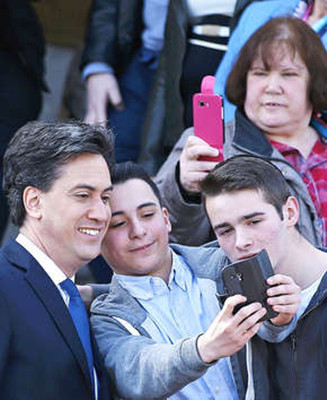年輕選民
Apathetic fallacy
無情的謬誤
Online voting could transform Britain's electorate
網絡投票改變英國選民
Fancy a snap election?
喜歡臨時選舉?
ONE-BY-ONE they approach the lectern, explaining why they will cast their votes. “Regardless of whether you do or don't, policies will be implemented,” says Princess, an activist, to loud cheers. As politicians from the main parties all make their speeches, the atmosphere in the lecture theatre at Queen Mary University, in east London, is electric. This is what Citizens UK, a network of university bodies, youth groups and religious gatherings, does so well: using existing civil-society organisations to spur young people into political action, and holding invigorating assemblies to meld them together.
選民們一個一個走上將臺,解釋他們為什么要投下選票。“不管你投還不是不投,政策還是要實施,”活動家Princess大聲歡呼道。各主要政黨的代表們都發表演講之后,東倫敦瑪麗皇后大學的演講廳充滿了激昂的情緒。這就是一個大學機構、青年團體和宗教集會網絡Citizens UK擅長的伎倆:利用現有的民間社會組織來鼓勵年輕人參與政治并舉辦鼓舞人心的集會來團結他們。

It is also the exception. At the 2010 election, according to Ipsos MORI, 44% of Britons aged between 18 and 24 voted, compared with 76% of those aged 65 and over (national turnout was 65%). The gap is relatively new: it was half the size in 1970, and has grown significantly only over the past two decades. It is also starker than elsewhere. In the German election in 2013, for example, 64% of first-time voters cast their ballots, compared with 75% for over-70s. Britain's low youth turnout helps to explain why the outgoing, Conservative-led government has protected public spending on older voters (guaranteeing increases in the state pension, for example) while doing little to solve a housing shortage, which affects the young most acutely.
但這也是一個例外。根據莫里市場公司調查顯示,在2010年的選舉中 ,18歲至24歲的英國選民中有44%的人投出選票,而65歲及以上的選民投票率達到76%(全國投票率為65%)。這個差距一直在變化:1970年的差距僅為2010年的一半,而在過去的20年間迅速增長。英國的差距也比其他地區明顯。在2013年的德國大選中,64%的第一次投票的選民(people aged between 17 and 21)進行了投票,70歲以上選民投票率為75%。英國低靡的年輕選民投票率在一定程度上解釋了外向的保守黨聯合政府為何樂意為老年選民保證公共支出(比如保證養老金增長)而不太愿意去解決對年輕人影響更大的住房短缺問題。
There are several reasons for the low turnout. One is that more Britons are going to university and ever-more live in short-term, rented accommodation. Both trends make it harder for authorities to register them. Another is that Britain's first-past-the-post system holds down insurgent parties—like the Green Party—which are popular among young voters but stand no chance of winning more than a handful of seats. This makes voting seem less effective. Perhaps the most convincing explanation is that mainstream parties, with their soporific committee meetings, are ill-attuned to a generation more at home in dynamic organisations like Citizens UK and 38 Degrees, an online campaigning network which claims to have over ten times as many members as the Labour Party.
年輕人的低投票率有一些原因。第一,越來越多的英國人進入大學,相較于以前更多地住在短期租賃的住所。這兩個趨勢讓當局很難為他們進行注冊。第二,英國選舉的簡單多數制能夠壓制叛亂黨派——比如綠黨——該黨在年輕人中更受歡迎,但是卻沒有機會贏得更多的席位。這讓選舉變得似乎不那么有效。最有說服力的理由或許是主流政黨中那些催人欲睡的委員會把更愿意呆在家里的這個群體推向了動態的組織,比如Citizens UK 和38 Degrees 這個聲稱擁有比勞工黨多10倍成員的在線競選網絡。
What to do? In the long term, political parties should become looser, more open and more welcoming. But one simple improvement would be online voting; a measure which John Bercow, the speaker of the House of Commons, has said he wants to see by 2020. That would both accommodate the footloose lives of young Britons, but also reflect how they like to do their politics: online and with reference to their social networks. Estonia introduced online voting in parliamentary elections in 2007. What is Britain waiting for?
我們該做什么?長遠來看,政黨應該變得更寬松、更開放、更受歡迎。但是在線投票或許是一個簡單的改進:下議院院長John Bercow說他希望在2020年看到這一景象。這會更加適應年輕英國人自由自在的生活,也能夠反映他們喜歡怎樣參與政治:通過在線和社交網絡。愛沙尼亞已經在2007年的議會選舉中引進了在線投票。英國還在等什么呢?譯者:胡雅琳 校對:吳倩












